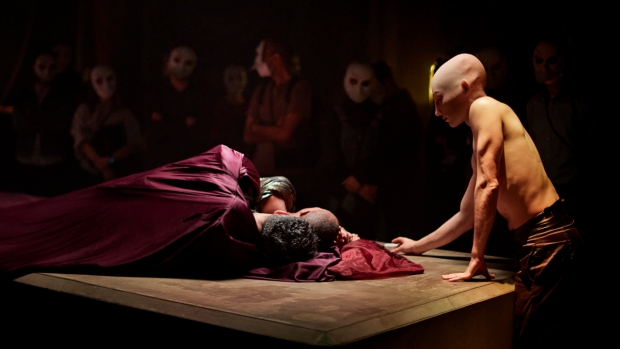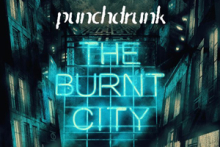Punchdrunk's The Burnt City – review

© Julian Abrams
Punchdrunk have made a model of immersive theatre that is all their own. With shows such as The Masque of the Red Death, The Drowned Man and It Felt Like a Kiss, they have become creators of ever-more elaborate worlds, purveyors of a kind of wrap-around sensation that has built them a huge audience.
The Burnt City is their biggest show yet. Over two buildings and 100,000 square feet in Woolwich, south-east London, they are tackling the epic story of the Trojan War, devoting one building to Greece and one to Troy. It is an astonishing act of bravura drama-making, shot through with unforgettable images and striking scenes, and yet it left me impressed rather than involved.
I have a problem with immersive theatre of this sort and it's not that thanks to my type of short-sightedness, I find it difficult to negotiate a dark space. Especially when wearing a Greek-drama style mask. My real issue is that I long for drama to have a narrative through-line; I want an author, be it Euripides or Jeremy O. Harris, to take me by the hand and to give me a rough clue as to what they are thinking.
The whole point of The Burnt City is that you must find your own way through its labyrinthine halls and make an individual journey among its multiple story-lines; it terrifies me that I will miss some vital clue.
My own narrative began in Mycenae, all vast echoing spaces. Here lovely Iphigenia is sent skipping down a long dining table under brightly moving lights, rigged out by her mother Clytemnestra as if for her bridal day. But then she shrugs on a blood-red gown, and walks to meet her father Agamemnon in the grey space beneath; and he sacrifices her on a giant sideways leaning cross in order to get a fair wind to take his army to Troy.
All this is magnificently staged. Co-director Maxine Doyle's choreography is, throughout, utterly transporting, movement that is chosen to express and communicate feeling. Felix Barrett's direction is equally bold and detailed; the actors move among you, utterly real, completely in their parts.
The design by Barrett, Livi Vaughan and Beatrice Minns shares the same quality of attention. Once you are in Troy – all small, shuttered streets, full of shops with bright neon names such as Hesperides, and night clubs called things like Divine Destiny – the level of care is almost overwhelming; each room and space is fully realised. You walk into one and find a woman weeping and stockings drying over a bath; into another and there is a man dressing himself; into a third and another man is thrashing around, bleeding from the eyes.
The spaces even smell subtly different – and Mycenae is notably chillier than Troy. As the immense, thunderous soundtrack assaults your ears, so episodes brand themselves on your eyes. I watched women in a nightclub murder a man and then drink his blood, and a sad, sensuous dance of despair as another woman stood beneath a man's hanging body, while smoke rose around us. I got back to Greece in time to witness Agamemnon murdered in the shower; I saw a woman picking up antler bones; I was in the bar in Troy when Hecuba and Cassandra made a stately progress, heads held high, to greet the conquering Greeks and saw Cassandra murdered for her pains.
Most of the time, though, I hadn't a clue what was happening. Maybe that's my fault: this is a piece that seems to require a better understanding of the intricacies of ancient myth and Greek and Roman literature than I actually have. But because I was confused, the emotional impact of all this immense labour was less powerful than it should have been.
At the very close, after three hours, I was back in the market square in Troy, and I witnessed Hecuba's blinding of Polymnestor in revenge for the murder of her own son. Or at least I think I did. What I actually saw was a dance of tiny disco steps, and a man captured by a crowd of women, one of whom puts out his eyes. She then stands beneath a shower of sand. It was beautiful and memorable, but I longed for more to help me make sense of it.











